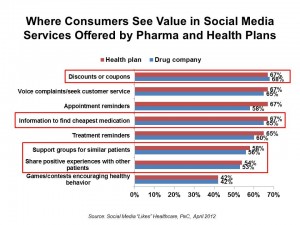 In PwC‘s landmark report, Social Media “Likes” Healthcare, there’s a data point obscured by lots of great information generated by the firm’s survey of 1,060 U.S. adults: that over one-half of people value patient support groups and social networks with other patients that are offered by drug companies.
In PwC‘s landmark report, Social Media “Likes” Healthcare, there’s a data point obscured by lots of great information generated by the firm’s survey of 1,060 U.S. adults: that over one-half of people value patient support groups and social networks with other patients that are offered by drug companies.
Not surprisingly, U.S. consumers. who are taking on increasing financial responsibility to pay for health care products and services, also highly value discounts and coupons, and access to information that helps them find the “cheapest” medications — both favored by two-thirds of people.
The report found, overall, that over one-third of U.S. adults use social media for accessing health care information, making health decisions, and supporting second opinions. I wrote about these top-line findings last week in Health Populi here.
Health Populi’s Hot Points: The U.S. Food and Drug Administration first met in November 2009 with industry stakeholders to discuss the issues surrounding social media and the pharmaceutical industry. Since then, the only words that have been promulgated on the topic were published in the Federal Register in December 2011, titled, Guidance for Industry Responding to Unsolicited Requests for Off-Label Information About Prescription Drugs and Medical Devices. These guidelines don’t address the services most American taxpayers say they’d find valuable as expressed in the PwC poll.
In the interim, U.S. consumers have had to assume a greater role in paying for health care — for doctor visits, hospital and ER admissions, therapeutic ancillaries like physical therapy, and prescription drugs. At the same time, people have joined social networks like Facebook, Twitter and YouTube as a matter of daily life: peoples’ “life flow” includes time spent every day engaging with these social networks, and PwC tells us that at least one-third of U.S. adults (not under 18s in this study) are using these social media platforms to inform health care decisions.
That the FDA has yet to provide clear guidance on pharmas’ role in social networks is unfortunate, but not unexpected. Social networks play a significant role now, and will ongoing, for people who are increasingly engaged in their own health care, and care for those they love. I’ve said it before, such as in The Wisdom of Patients, my report for California HealthCare Foundation on the role of social networks in health, published (can it possibly be?) four years ago by CHCF: social networks are an integral part of the DIY health landscape for people. Pharmas and medical device companies who don’t engage in transparent and trustworthy ways are missing an opportunity to help people help themselves, and re-build trust between their products, brands and people.
FDA, are you listening?




 I'm in amazing company here with other #digitalhealth innovators, thinkers and doers. Thank you to Cristian Cortez Fernandez and Zallud for this recognition; I'm grateful.
I'm in amazing company here with other #digitalhealth innovators, thinkers and doers. Thank you to Cristian Cortez Fernandez and Zallud for this recognition; I'm grateful. Jane was named as a member of the AHIP 2024 Advisory Board, joining some valued colleagues to prepare for the challenges and opportunities facing health plans, systems, and other industry stakeholders.
Jane was named as a member of the AHIP 2024 Advisory Board, joining some valued colleagues to prepare for the challenges and opportunities facing health plans, systems, and other industry stakeholders.  Join Jane at AHIP's annual meeting in Las Vegas: I'll be speaking, moderating a panel, and providing thought leadership on health consumers and bolstering equity, empowerment, and self-care.
Join Jane at AHIP's annual meeting in Las Vegas: I'll be speaking, moderating a panel, and providing thought leadership on health consumers and bolstering equity, empowerment, and self-care.